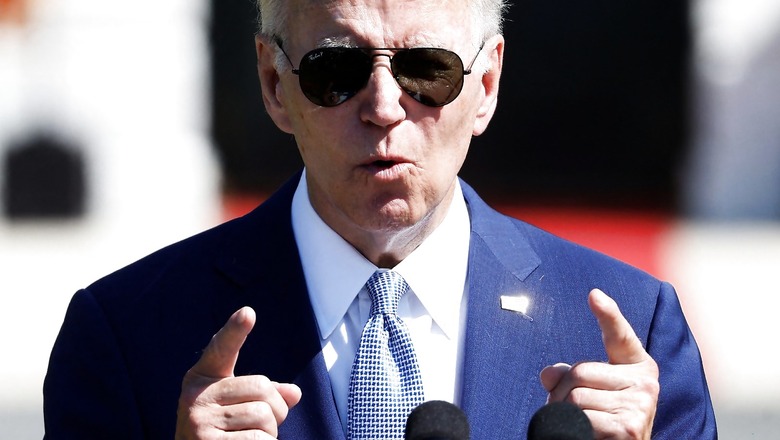
views
United States President Joe Biden completed his West Asia visit on July 13, with trips to Jerusalem and Riyadh. There is a need to understand the relevance of the visit concerning deepening of the relationship in the Middle East region as they face their common foe Iran.
On the second day of Biden’s visit, the US and Israel signed a joint pledge to deny Iran access to nuclear arms. This diplomatic initiative is a show of unity for allies long divided over the politics with Tehran. This symbolic treaty between the US and Israel has laid out for Iranian leadership a path to return to the Joint Comprehensive Agreement with the US which is still waiting for a response.
Both Israel and Saudi Arabia have made desperate attempts to thwart the US-Iran nuclear deal in 2013. The 2013 Nuclear Deal with Iran created discomfort for Saudi Arabia as well as Israel. Saudi saw it as an opportunity for Iran to improve its economic capabilities to create a nuclear weapon. Saudi argued that this deal was signed for a limited time of 15 years and did not mandate Iran to destroy its nuclear technologies. The present declaration between Israel and the US reiterated and satisfied their anti-Iran position to prevent Iran from acquiring nuclear weapons.
This recent declaration by the US and Israel vehemently pronounced that both the countries are not going to allow Iran to acquire a nuclear weapon. Both Washington and Tel Aviv made separate statements about the possible preemptive war against Iran.
The US reaffirmed its support for Israel’s regional military edge and “ability to defend itself”. The Jewish country considers it an existential threat if Iran acquires a nuclear weapon. Israel’s Prime Minister said in the signing ceremony that the only way to stop Iran is if Iran knows that the free world will use force. As the scope of fresh negotiations between the US and Iran on the nuclear weapon deal is dooming, the scope of uncertainty and conflict is rising.
On his second leg of the visit, Biden visited Saudi Arabia. In his first stopover, the focus of the visit remained enhancing the regional security architecture to counter Iran. In this light what needs to be understood is the relevance of the Abraham Accord, which is a set of normalisation agreements signed by Israel with the UAE, Bahrain, Sudan, and Morocco initiated by then President Donald Trump in 2020. These treaties call for promotion of peace and cooperation in the Middle-East and interestingly even the title of Abraham refers to the common patriarch of the three religions of Judaism, Christianity, and Islam. The relevance of these Accords can be understood from the fact that in the past as per the 2002 Arab Peace Initiative led by Saudi Arabia and agreed by the 22 member states of the Arab League, the normalisation of ties with Israel by an Arab country beyond Egypt and Jordan would be possible only if a peace agreement is reached between Palestine and Israel.
It is in this context that this opening up of the Arab countries holds great significance. To illustrate, the relations between Sudan and Israel were premised on the famous “three nos” relating to no peace with Israel, no recognition of Israel and no negotiation with Israel resolutions that were adopted in the aftermath of the 1967 six-day War by the Arab League in their meeting in Sudan’s capital of Khartoum. By normalising its relations with Israel, Sudan, at least symbolically, has agreed to negotiate with Israel, recognise it, and make peace with it.
However, states such as Kuwait and Qatar have rejected the proposition of having normal ties without a resolution to the Israel-Palestinian conflict.
In a similar vein, these states wish to see how the Israel-Emirati and Israel-Bahrini partnership play out and whether there will be any kind of internal resistance within these states or in the region as a whole.
Going forward, although the deal is against the Iranian nuclear program, and promises peace and security, it remains to be seen whether it will ensure long-standing peace.
Abhinav Mehrotra is the Assistant Professor, OP Jindal Global University, and Dr Biswanath Gupta is the Associate Professor, OP Jindal Global University. Views expressed are personal.
Read the Latest News and Breaking News here













Comments
0 comment